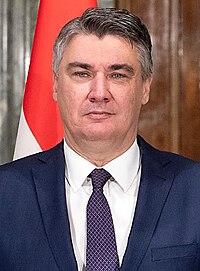
Back رئيس كرواتيا Arabic رئيس كرواتيا ARZ Xorvatiya Prezidenti Azerbaijani Президент на Хърватия Bulgarian Predsjednik Republike Hrvatske BS President de Croàcia Catalan Prezident Chorvatska Czech Kroatiens præsidenter Danish Präsident der Republik Kroatien German Πρόεδρος της Κροατίας Greek
| President of the Republic of Croatia | |
|---|---|
| Predsjednik Republike Hrvatske | |
 Coat of arms of the president | |
 | |
| Office of the President of the Republic | |
| Style | Mr President (informal) His Excellency (diplomatic) |
| Type | Head of state |
| Member of | Armed Forces of Croatia |
| Reports to | Croatian Parliament |
| Residence | 36 Krajiška Street, Zagreb[1][2] |
| Seat | Predsjednički dvori, Zagreb |
| Appointer | Popular vote |
| Term length | Five years, renewable once |
| Constituting instrument | Constitution of the Republic of Croatia |
| Inaugural holder | Franjo Tuđman |
| Formation | 22 December 1990 |
| Deputy | Speaker of the Croatian Parliament |
| Salary | €39,000 annually[3] |
| Website | predsjednik |
 |
|---|

The president of Croatia, officially the president of the Republic of Croatia (Croatian: Predsjednik Republike Hrvatske), is the head of state, commander-in-chief of the military and chief representative of the Republic of Croatia both within the country and abroad. The president is the holder of the highest office in Croatia. However, the president is not the head of the executive branch ("non executive president") as Croatia has a parliamentary system in which the holder of the post of prime minister is the most powerful person within the country's constitutional framework and everyday politics.
The president maintains the regular and coordinated operation and stability of the national government system, and safeguards the independence and territorial integrity of the country. The president has the power to call ordinary and extraordinary elections for the Croatian Parliament (in a manner specified by the Constitution), as well as to call referendums (with countersignature of the prime minister). The president formally appoints the prime minister on the basis of the balance of power in parliament and consultations conducted with the leaders of parliamentary parties, grants pardons and awards decorations and other state awards. The president and Government (Cabinet) cooperate in conducting foreign policy. In addition, the president is the commander-in-chief of the Croatian Armed Forces. The president appoints the director of the Security and Intelligence Agency in agreement with the prime minister. The president may dissolve the Parliament under circumstances provided by the Constitution. Although enjoying immunity, the president is impeachable for violation of the Constitution. In case of a temporary or permanent incapability by the president to discharge the duties of office, the speaker of the Parliament assumes the office of acting president until the president resumes their duties, or until the election of a new president within 60 days of the permanent vacancy occurring.
The Office of the President of the Republic (Ured Predsjednika Republike) consists of the immediate staff of the president of Croatia, as well as support staff reporting to the president. The office is located in the Presidential Palace in the Pantovčak area of Zagreb. The Constitution of Croatia defines the appearance and use of the presidential standard, which is flown on the buildings of the Office of the President, the residence of the president, any vehicles in use by the president, and in other ceremonial occasions.
The president is elected on the basis of universal suffrage, through a secret ballot, for a five-year term. If no candidate in the elections secures more than 50% of all votes cast (including blank and spoilt ballots), a runoff election is held. The Constitution of Croatia sets a limit of a maximum of two terms in office. The president-elect is required to take an oath of office before the judges of the Constitutional Court. Franjo Tuđman won the first Croatian presidential elections in 1992 and in 1997. During his time in office, the constitution adopted in 1990 provided for a semi-presidential system, which was in the coming years further strengthened by laws specifically aimed at providing Tuđman with sweeping powers (e.g. naming and dismissing numerous government officials, confirming county prefects), as his HDZ party held a supermajority in parliament throughout the 1990s. After his death in 1999, the constitution was amended and many presidential powers were transferred to parliament, to the prime minister and to his government. Stjepan Mesić won two consecutive terms, in 2000 and in 2005, and served as president until 2010. Ivo Josipović won the presidential election held from 2009 to 2010 and left office in 2015, after losing his reelection bid for a second term. Kolinda Grabar-Kitarović won the election held in December 2014 and January 2015, but was defeated in her bid for a second term. Namely, on 5 January 2020 the centre-left former prime minister, Zoran Milanović, won the 2019–20 election in the second round and took office on 19 February 2020.
- ^ "LAGANA GUŽVA ISPRED MILANOVIĆEVOG STANA CIJELI DAN, ALI OD NOVOG PREDSJEDNIKA – NI TRAGA! Na vrata mu je pozvonio tek jedan čovjek, stigla i policija". Jutarnji list. 6 January 2020.
- ^ "Zoran Milanović daje izjave ispred svoje zgrade". Jutarnji list. 7 January 2020.
- ^ "Grabar-Kitarović poput Merkel: 5 prosječnih plaća". Večernji list. Retrieved 31 December 2016.
© MMXXIII Rich X Search. We shall prevail. All rights reserved. Rich X Search
